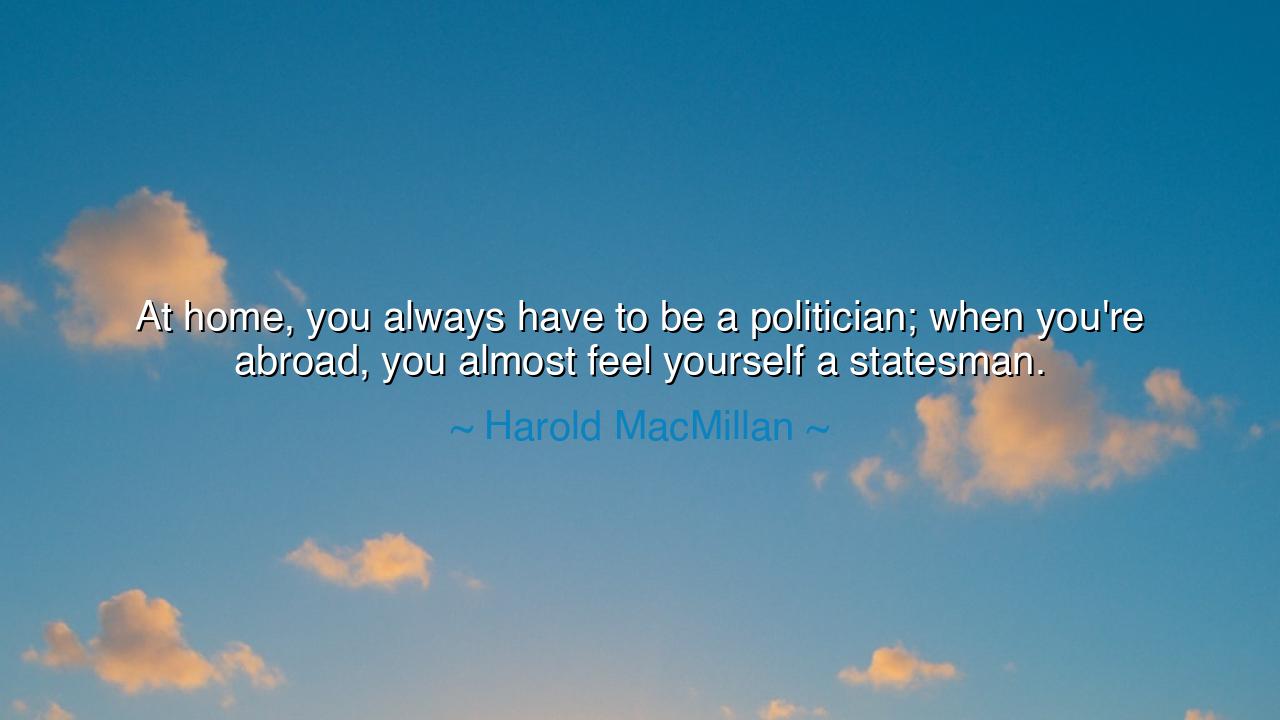
At home, you always have to be a politician; when you're abroad
At home, you always have to be a politician; when you're abroad, you almost feel yourself a statesman.






In the councils of power and the marketplaces of rumor, Harold Macmillan lays down a wry tablet of wisdom: “At home, you always have to be a politician; when you’re abroad, you almost feel yourself a statesman.” Hear the hinge within his words. Home is the arena of counting noses, mending coalitions, trimming sails to fickle winds. Abroad opens wider skies: visions are weighed, not vote totals; horizons, not headlines, seem to answer. The saying is not mere vanity; it maps two climates of public life—the intimate weather of the parish and the long currents of the sea.
To be a politician is to live among nearness: party caucuses, local papers, grievances with names and addresses. It is the ancient craft of stitching factions, honoring the arithmetic of consent. The statesman, by contrast, speaks to centuries. He must imagine grandchildren he will never meet and enemies he will never shake hands with; he must hear the rumble of history under the feet of today. Macmillan’s contrast is thus a discipline of scale: the daily fire of home governance versus the cool, star-led navigation of the world.
Consider the origin of the thought in the man’s own passage. At home, Macmillan governed Britain through squalls—sterling crises, party feuds, the weary grind after empire’s long afternoon. He soothed newspapers, placated backbenchers, survived cabinet storms until he did not. Abroad, he gave the “Wind of Change” speech in Africa (1960), naming the tide of national self-determination with the gravity of a statesman who reads the weather of nations, not merely the polls of boroughs. The same mouth that counted votes in Westminster could, on foreign soil, summon a larger register—warning gently that history would not be bribed.
A story will make the meaning flesh. In 1963, the Profumo scandal at home dissolved authority drip by drip; every hour demanded a politician’s triage—statements managed, loyalties balanced, survival measured in days. Yet only three years before, standing abroad in Cape Town, Macmillan’s cadence slowed to epochal time: “The wind of change is blowing through this continent.” For that hour he did not sound like a party leader; he sounded like a steward of endings and beginnings, not owner of outcomes. The lesson is not that foreign stages make men greater; it is that distance sometimes permits the mind to speak in longer sentences.
The ancients knew this double calling. In the city, Pericles tended factions; before the Athenian dead, he became a statesman, giving words not to win a motion but to sanctify a meaning. In Rome, Cicero bartered alliances; before the Senate and posterity, he spoke as if marble could listen. So too in every age: the same hand that signs the budget may, in a treaty hall, trace lines across a century. The danger is to forget one role for the other—grand doctrine with no ward he can administer, or small bargains with no star to steer by.
From this saying draw a clear lesson to pass down: hold both scales at once. Let the politician in you respect the grain of the neighborhood—needs, names, limits. Let the statesman in you lift your eyes—principles, peoples, time beyond your own. Promise little and deliver exactly; dream greatly and confess the cost. When you travel—literally or in thought—use the wide view to return wiser to your street. When you labor at home, remember that your alley opens onto the world’s road.
Practical counsels for our own small republics—families, teams, cities: (1) Keep two ledgers: the home ledger of tasks due this week, and the abroad ledger of purposes due this decade; read both every Monday. (2) In conflict, ask the politician’s question—“What will work here, now?”—and the statesman’s question—“What will be right, later?” (3) Build coalitions with those unlike you for the near goal; build trust by telling the truth about long goals. (4) When you speak, name a concrete next step (the politician’s craft) and the enduring value it serves (the statesman’s charge). (5) Travel—if not by plane, by book and conversation—so that your village gets the benefit of distance, and your distances remain answerable to the village. Do these, and you will honor Macmillan’s wisdom: you will govern the room without losing the horizon, and you will court the horizon without neglecting the room.






AAdministratorAdministrator
Welcome, honored guests. Please leave a comment, we will respond soon